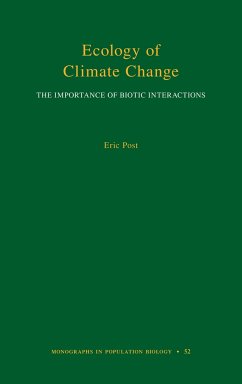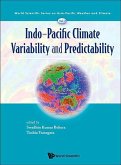Rising temperatures are affecting organisms in all of Earth's biomes, but the complexity of ecological responses to climate change has hampered the development of a conceptually unified treatment of them. In a remarkably comprehensive synthesis, this book presents past, ongoing, and future ecological responses to climate change in the context of two simplifying hypotheses, facilitation and interference, arguing that biotic interactions may be the primary driver of ecological responses to climate change across all levels of biological organization. Eric Post's synthesis and analyses of ecological consequences of climate change extend from the Late Pleistocene to the present, and through the next century of projected warming. His investigation is grounded in classic themes of enduring interest in ecology, but developed around novel conceptual and mathematical models of observed and predicted dynamics. Using stability theory as a recurring theme, Post argues that the magnitude of climatic variability may be just as important as the magnitude and direction of change in determining whether populations, communities, and species persist. He urges a more refined consideration of species interactions, emphasizing important distinctions between lateral and vertical interactions and their disparate roles in shaping responses of populations, communities, and ecosystems to climate change.
"I believe that this book will become the go-to reference for gaining a foundational understanding of how global climate change has and will continue to transform ecological systems in the face of anthropogenic impacts. An encyclopedic synthesis of the field, it provides exemplary coverage of the vast literature. This is an authoritative treatment of an important topic in ecology and conservation."--Oswald J. Schmitz, Yale University "To predict the responses of species to climate change, Post shows how interactions between species may be as important as density-independent responses to changes in their abiotic environment. Most ecologists have focused on the latter. Post makes a great case that the response of species to climate change is likely to unfold in the context of their interactions with other species, through competition, predation, and, in the case of humans, land-use change."--William H. Schlesinger, president of the Cary Institute of Ecosystem Studies
Hinweis: Dieser Artikel kann nur an eine deutsche Lieferadresse ausgeliefert werden.
"I believe that this book will become the go-to reference for gaining a foundational understanding of how global climate change has and will continue to transform ecological systems in the face of anthropogenic impacts. An encyclopedic synthesis of the field, it provides exemplary coverage of the vast literature. This is an authoritative treatment of an important topic in ecology and conservation."--Oswald J. Schmitz, Yale University "To predict the responses of species to climate change, Post shows how interactions between species may be as important as density-independent responses to changes in their abiotic environment. Most ecologists have focused on the latter. Post makes a great case that the response of species to climate change is likely to unfold in the context of their interactions with other species, through competition, predation, and, in the case of humans, land-use change."--William H. Schlesinger, president of the Cary Institute of Ecosystem Studies
Hinweis: Dieser Artikel kann nur an eine deutsche Lieferadresse ausgeliefert werden.








